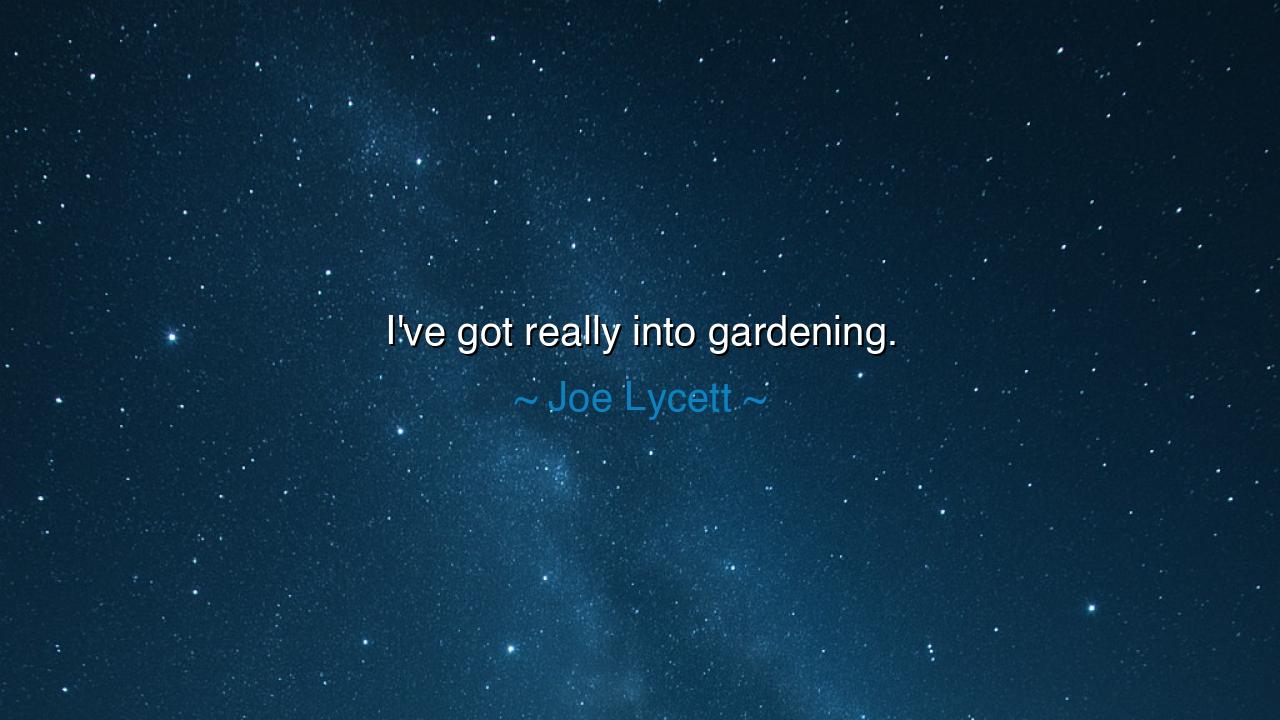
I've got really into gardening.






In the great expanse of human endeavor, where our pursuits often lead us down paths of complexity and ambition, there exists a quiet, yet profound, art that has beckoned countless souls toward its embrace. "I've got really into gardening," says Joe Lycett, a simple declaration that speaks volumes. It is not just a statement of interest, but a profound shift in perspective. To say one has "gotten into gardening" is to acknowledge that the humble act of tending the earth holds a wisdom that far exceeds its simplicity. It is a journey, not only into the soil but into the heart of life itself.
Gardening, in its essence, is an act of creation. It is the cultivation of life from the very dust of the earth, a direct engagement with the natural world that has sustained humanity for as long as memory reaches. The gardener does not merely plant; they partner with the forces of nature. They are stewards, caretakers, shaping the future with each seed they sow. To "get into gardening" is to enter into a relationship with the earth, one of patience, nurture, and transformation. It is a path that invites us to slow down, to reconnect with something ancient and vital, something that nourishes not just the body but the soul.
In the time of the ancients, the garden was revered not merely as a source of food but as a sacred space, where the gods themselves were thought to walk. The great philosopher Plato, in his dialogues, spoke often of the balance between nature and reason, between the spiritual and the physical. For him, the garden was a place of reflection, a place where the mind could be quieted, and the soul could commune with the eternal truths of the cosmos. Likewise, the great mathematician and philosopher Pythagoras believed that the act of planting was an expression of the divine order of the universe, each seed sown a symbol of the harmony between all things. To cultivate the earth, then, was not merely to grow food—it was to align oneself with the very rhythm of life itself.
Joe Lycett’s words, though modern, carry echoes of these ancient truths. In our time, we often rush through life, consumed by the demands of work, technology, and the relentless pursuit of success. But gardening offers a reprieve, a space where time slows and we are forced to observe the miracle of growth in its simplest form. The gardener is not in a hurry, for the earth’s rhythms cannot be rushed. Instead, the gardener learns the sacred practice of patience, of tending to the soil with care and love, understanding that growth, whether of a plant or of the soul, cannot be forced—it must unfold in its own time.
Consider the example of the Japanese Zen gardens, where monks for centuries have cultivated simple, yet profoundly beautiful, landscapes that invite contemplation and peace. These gardens, though minimalist, are full of meaning. Each stone, each plant, and each raked line of gravel holds within it a lesson about balance, simplicity, and harmony with the natural world. To the Zen practitioner, gardening is not merely a task—it is a meditation. In every rake, every plant placed with care, there is a reflection of the inner stillness and mindfulness that the gardener seeks to cultivate within themselves.
In embracing gardening, one is called to create, not just in the external world, but within. The gardener’s hands are those of an artist, shaping life and beauty from the very clay of the earth. But there is also a deeper calling—gardening teaches us to observe, to notice the minute changes in nature, to witness the miracle of life unfolding in the smallest of spaces. The gardener becomes attuned to the needs of the plants, the rhythms of the seasons, and, in turn, attuned to their own inner rhythm. To “get into gardening” is to open oneself to this quiet wisdom, to make space for stillness and contemplation in a world that often rushes forward without thought.
So, let us take from Joe Lycett’s words a lesson in reflection and engagement. As you step into your own garden, whether it be a grand plot or a small balcony of potted herbs, allow it to be a place of stillness, a space where you can slow down, breathe, and reconnect with the simple rhythms of life. Like the ancients who understood the profound significance of tending the earth, you, too, can find meaning in the quiet act of planting, nurturing, and watching life grow. For in these small, sacred acts, we find the deeper truths of existence—truths that are often hidden in the rush of modern life, waiting patiently to be discovered in the hum of the garden’s quiet embrace.






AAdministratorAdministrator
Welcome, honored guests. Please leave a comment, we will respond soon